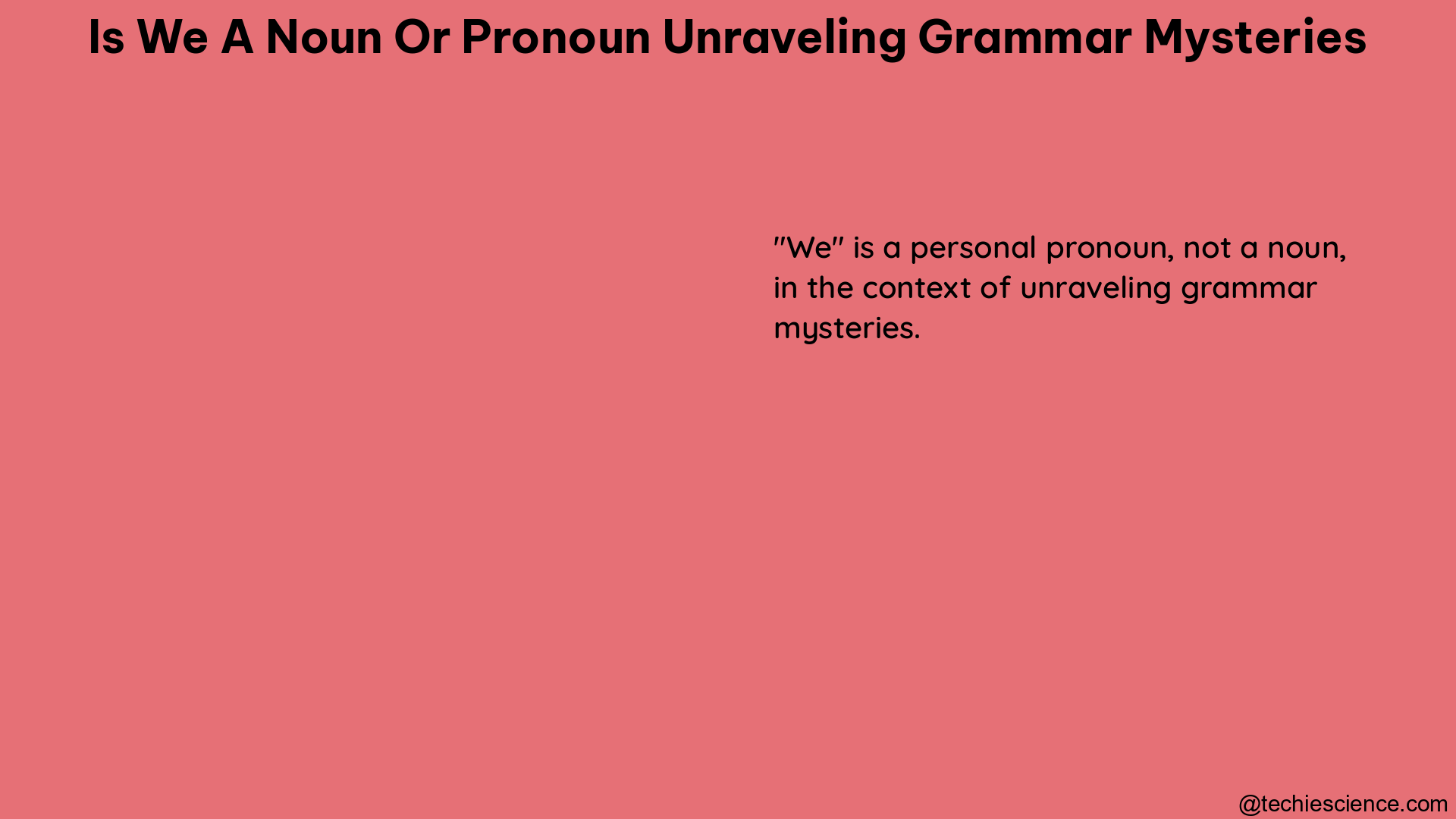The question “Is ‘we’ a noun or pronoun?” is a fundamental query in unraveling grammar mysteries. To provide a detailed explanation, let’s delve into the grammatical specifications, theoretical explanations, and advanced hands-on details.
Grammatical Specification of ‘We’
The word “we” is a pronoun, specifically a first-person plural pronoun. Pronouns are words that replace nouns in a sentence, making it easier to communicate without repetition. “We” indicates the speaker and one or more other people, functioning as a subject pronoun, meaning it can be the subject of a sentence.
Examples of ‘We’ as a Pronoun
- Subject Pronoun: “We are going to the store.” (Here, “we” is the subject of the sentence.)
- Plural Pronoun: “We, the students, are going to the party.” (Here, “we” includes the speaker and other students.)
Theoretical Explanation: Nouns vs. Pronouns

Understanding the distinction between nouns and pronouns is crucial in unraveling grammar mysteries. Nouns are words that refer to specific objects, people, or concepts, whereas pronouns replace nouns to avoid repetition and enhance clarity.
In the case of “we,” it is a pronoun because it represents a group of people, including the speaker, rather than being a specific noun. This is the key difference between nouns and pronouns.
Illustrating Nouns and Pronouns
To further illustrate the difference, consider the following examples:
- Noun: “The team is winning.” (Here, “team” is a noun.)
- Pronoun: “We are winning.” (Here, “we” is a pronoun replacing the noun “team.”)
Advanced Hands-on Details
Let’s dive deeper into the grammatical nuances of “we” as a pronoun:
Subjective Case
As mentioned earlier, “we” is a subject pronoun, meaning it can be the subject of a sentence. In the subjective case, “we” is used as the subject of a verb.
Example: “We are going to the park.”
Objective Case
In the objective case, “we” is used as the object of a verb or preposition.
Example: “The teacher called on us to answer the question.”
Possessive Case
The possessive form of “we” is “our,” which indicates ownership or possession.
Example: “Our team won the championship.”
Reflexive Case
The reflexive form of “we” is “ourselves,” which is used when the subject and object of a sentence are the same.
Example: “We congratulated ourselves on our achievement.”
Practical Applications
Understanding the grammatical role of “we” as a pronoun has practical applications in various aspects of language and communication:
- Writing and Composition: Proper use of “we” can enhance clarity, avoid repetition, and improve the flow of written communication.
- Public Speaking: Skillful use of “we” can create a sense of inclusivity and connection with the audience.
- Language Learning: Mastering the distinction between nouns and pronouns, including “we,” is a crucial step in learning and improving language proficiency.
Conclusion
In conclusion, “we” is a pronoun, specifically a first-person plural subject pronoun. It replaces nouns to provide clarity and avoid repetition in sentences. Understanding the grammatical specifications, theoretical explanations, and advanced hands-on details of “we” as a pronoun is essential in unraveling grammar mysteries and improving overall language skills.
References
- Understanding Pronouns: What is a Pronoun?
- Nouns vs. Pronouns: Identifying the Difference
- Unravel a Mystery

The lambdageeks.com Core SME Team is a group of experienced subject matter experts from diverse scientific and technical fields including Physics, Chemistry, Technology,Electronics & Electrical Engineering, Automotive, Mechanical Engineering. Our team collaborates to create high-quality, well-researched articles on a wide range of science and technology topics for the lambdageeks.com website.
All Our Senior SME are having more than 7 Years of experience in the respective fields . They are either Working Industry Professionals or assocaited With different Universities. Refer Our Authors Page to get to know About our Core SMEs.